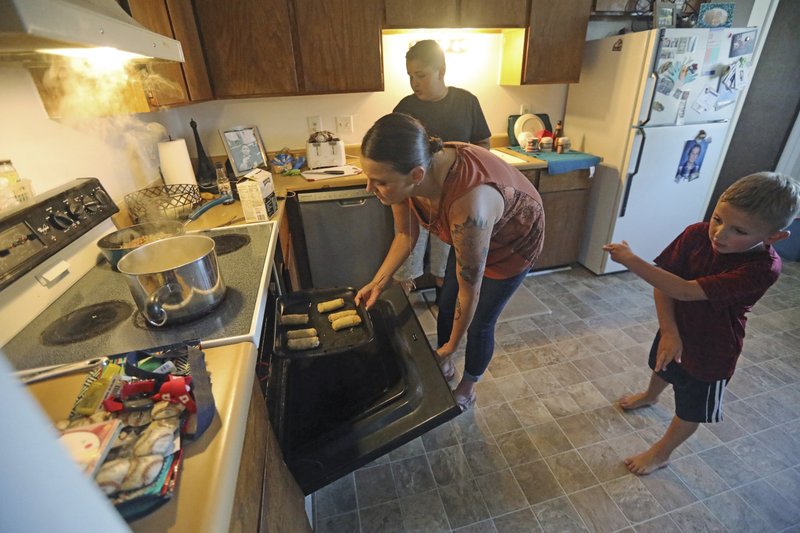SALT LAKE CITY -- Planned Parenthood clinics in several states are charging new fees, tapping financial reserves, intensifying fundraising and warning of more unintended pregnancies and sexually transmitted diseases after its decision to quit a $260 million federal family planning program in an abortion dispute with President Donald Trump's administration.
The fallout is especially intense in Utah, where Planned Parenthood has been the only provider participating in the nearly 50-year-old Title X family planning program and will now lose about $2 million yearly in federal funds that helped 39,000 mostly low-income, uninsured people. It plans to maintain its services -- which include contraception, STD testing and cancer screening -- but is considering charging a small copay for patients who used to get care for free.
Planned Parenthood in Minnesota is in a similar situation, serving about 90% of the state's Title X patients, and plans to start charging fees due to the loss of $2.6 million in annual funding.
The organization is concerned about the spread of unintended pregnancies and sexually transmitted diseases.
"We believe there will be a public health crisis created by this denial of care," said Sarah Stoesz, the Minnesota-based president of Planned Parenthood North Central States. "It's a very sad day for the country."
Planned Parenthood and several other providers withdrew from the program earlier this week rather than comply with a newly implemented rule prohibiting participating clinics from referring women for abortions.
Anti-abortion activists who form a key part of Trump's base have been campaigning to "defund Planned Parenthood." Among its varied services, it is a major abortion provider, and the activists viewed the grants as an indirect subsidy.
About 4 million women are served nationwide by the Title X program, which makes up a much bigger portion of Planned Parenthood's patients than abortion. But the organization said it could not abide by the abortion-referral rules because it says they would make it impossible for doctors to do their jobs.
Planned Parenthood said it's dedicated to maintaining its current services in Utah, but CEO Karrie Galloway acknowledged it won't be easy and could cause some "pain on all sides."
She said the organization plans to lean heavily on donors to make up the funding gap while staff members assess how they'll cope. Among the possibilities are instituting copays of $10-$15 per visit, shortening hours and trimming spending. She doesn't plan to lay off staff, but said she may not be able to fill jobs when people leave or retire.
Minnesota is planning fees as well.
"We'll continue to offer all services, and keep clinic doors open, but we'll be charging patients on a sliding scale who we didn't charge before," Stoesz said. "Vulnerable people who previously were able to access birth control and STD testing for free will no longer be able to do so."
Elsewhere, the impact of Planned Parenthood's withdrawal will vary from state to state.
In the South there will be little impact because Planned Parenthood did not provide Title X services in most of the region's states.
Planned Parenthood in Arkansas hasn't participated in Title X "for many years," a spokesman said in an email.
The last date of its involvement wasn't immediately available due to organizational restructuring during the last few years, she said.
The organization in the state is overseen by Planned Parenthood Great Plains, which also manages clinics in Oklahoma, Missouri and Kansas.
Governments in some Democratic-controlled states, including Hawaii, Illinois, New York and Vermont, say they will try to replace at least some of the lost federal funding.
In Washington state, Democratic Gov. Jay Inslee -- fresh from quitting the presidential campaign -- vowed to join that group of states. His administration is pulling Washington out of Title X because of the new rule and will ask the Legislature to make up for the $4 million in federal funding that will be lost.
"We will not comply with their dangerous, unconstitutional, illegal rules," Inslee said Thursday. "We will make sure this health care continues."
Planned Parenthood will continue to participate in Medicaid, the federal health-coverage program for low-income Americans. That's Planned Parenthood's biggest source of government funding -- about $400 million or more annually in recent years. The Republican-controlled legislatures in Texas, Iowa and Missouri have taken steps to block that flow of funds in their states.
Information for this article was contributed by Brady McCombs, Patrick Whittle, Holly Ramer and Rebecca Boone of The Associated Press; and by Kat Stromquist of the Arkansas Democrat-Gazette.
A Section on 08/23/2019

